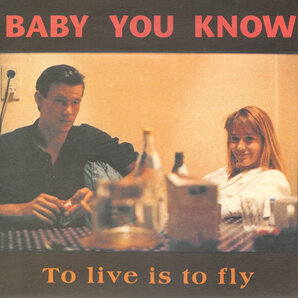Baby You Know: To Live Is To Fly / Clear Water (Tapete Records) (Reissue)
Ahead of their time, rootsy Go-Betweens-affiliated indie-poppers' bedsit angst reappriased
Released Jul 30th, 2024 via Tapete Records / By Ben Wood
 Baby You Know are no longer a going concern, but they were a big deal in their homeland of Germany in the 1990s. However, while hardcore Go-Betweens fans may recognise the name (BYK's violinist and occasional vocalist Karin Baurnier is married to Robert Forster, with whom she has released three albums) the indie outfit never made it big elsewhere. This re-release of 1990 debut album To Live Is To Fly and 1992's Clear Water - now available digitally - features an intriguing mix of influences for their neck of the woods (Dylan, the Velvets, an emerging proto-Americana) overlaid with a certain boho sensibility.
Baby You Know are no longer a going concern, but they were a big deal in their homeland of Germany in the 1990s. However, while hardcore Go-Betweens fans may recognise the name (BYK's violinist and occasional vocalist Karin Baurnier is married to Robert Forster, with whom she has released three albums) the indie outfit never made it big elsewhere. This re-release of 1990 debut album To Live Is To Fly and 1992's Clear Water - now available digitally - features an intriguing mix of influences for their neck of the woods (Dylan, the Velvets, an emerging proto-Americana) overlaid with a certain boho sensibility.To Live Is To Fly has a definite 'arty dissolution on the dole' vibe, from the title - by bard of beakness Townes Van Zandt - to its mournful violin and sometimes gothy lyrical preoccupations (the opening trio are titled Suicide Show, Rimbaud and It's Different At Night). Suicide Show suggests that the night people may have it coming, before singer Erhard Grundl (now Green Party culture spokesman, fact fans!) claims Dylan as the One True Faith ('I don't believe in anything except Blood on the Tracks') - a statement backed up with a Dylanesque harmonica outro.
The catchy Who Cares would make a great drunken singalong, its ragged, paradoxically happy depair sharing DNA with Bright Eyes: 'Who cares if you're happy? / Who cares if you're sad?... I care.' Rimbaud hymns France's 19th century high priest of decadence, whose abandonment of 'pain and poetry' was also the subject of a Dylan song. While decent elsewhere on the album, the slightly liffy lyrics on this one sound like a parody of an arty band striking a pose - although something may have been lost in translation.
It's Different At Night has a nice mantric guitar groove, the strongest hint of the Velvets influence that was pretty much everywhere in the era's indie-rock sphere. Boho break-up song Considering A Change features lead vocals and violin from Baurnier and realises that you can't pay your rent with cool ('You offered love, I needed money'). Between the Wars has a spoken word section and grinding, insistent groove, while closer Night Must Fall throws some atonal guitar into the mix.
The second LP of the set, Clear Water leans more into mid-60s guitar-pop and proto- alt.country, as late-night interiors are replaced by sweeping cinematic Western skies. It starts with a bang the record can't quite maintain: Lily Of the Valley sounds gorgeous thanks to jangly guitar, rubbery bass and dextrous drums. The bookish, 'indie pop about girls' lyrics are very Go-Betweens while the 'Oh yeahs' suggest a young Bobby Gillespie in transported/gone mode (this is a very good thing). Add some classic early Byrds jangle, another lyrical Dylan reference ('She's killing me alive') and a touch of first-album Love in its garagey basicness, and you have a belter. El Paso is a radical change of tack but works like a charm, a feelgood and super-funky Tex-Mex instrumental with chicken-scratch guitar, violin and Johnny Cash chick-a-boom. It swings like a barn door in the proverbial hurricane.
House on the Hill has touches of early, country-tinged Reckoning-era REM, particularly in its Mike Mills-esque backing vocals. Some nice tempo changes make it a decent album track, if not a standout. The semi-acoustic Blind Man's Bluff features a flute solo (always to be encouraged). However, the middle of the album sags somewhat, starting with the over-earnest The Last of the Buffaloes.
Things pick up again with the bluegrass feel of Midnight Train (compelete with banjo) - though the fact that Grundl starts laughing a couple of times suggests that this is a long way from natural territory still. Baurnier takes the mic once more on the minimal but affectingly plaintive I Love You, before Outlaw signs off with a six-and-a-half-minute epic referencing Born on the Bayou, The Last Picture Show and the Stones' Moonlight Mile ('With a head full of snow'). Add a sax solo a la Born to Run-era Springsteen and we have a swelling, violin-driven lyrical piece which can't reach the heights of Dylan, Van Morrison and the Waterboys, but isn't without its moments.
Overall, these two albums are a snapshot of a band in transition: moody bedsit bards with a love of the classics, maintaining their lyrical diaristic lyrical approach but moving towards a rootsier sound. Its most appealing aspect for Anglo indie-heads is the outsider perspective that the band have towards their source material. 3/5





 All Content RSS Feed
All Content RSS Feed
Follow Bearded on...